Starting a property management company opens the door to a rewarding and busy business opportunity.
Managing rental properties involves much more than collecting rent; it’s about nurturing positive relationships, ensuring compliance with local laws, and keeping properties in excellent condition.
Following the ten steps outlined in this blog will give you insight into everything you need to succeed, from assessing local market demand to building a network of property owners. You’ll learn to develop a solid business plan, hire skilled staff, and market your services effectively.
Read on!

What is a Property Management Company?
A property management company is a business that handles the day-to-day operations of rental properties for property owners or real estate investors.
These companies ensure that households, apartments, commercial spaces, or rental properties are managed efficiently while adhering to regulations. By doing so, owners can save time, reduce stress, and focus on other priorities.
Such companies typically oversee tenant screening, rent collection, lease agreement management, and property maintenance.
Some responsibilities every day for many property management firms include:
- Finding and screening tenants: They advertise vacancies, review applications, and perform background checks to select reliable tenants.
- Handling lease agreements and renewals: Preparing accurate lease agreements, coordinating renewals, and addressing lease terms helps ensure smooth communication.
- Managing maintenance and repairs: Property issues require quick attention. These companies coordinate with contractors to resolve problems efficiently, from broken appliances to larger repairs.
- Overseeing rent payments and late fees: Timely rent collection is crucial. Management companies enforce payment deadlines and handle late payments when necessary.
- Staying compliant with laws: Knowledge of fair housing laws and other regulations keeps property managers on the right side of legal requirements.
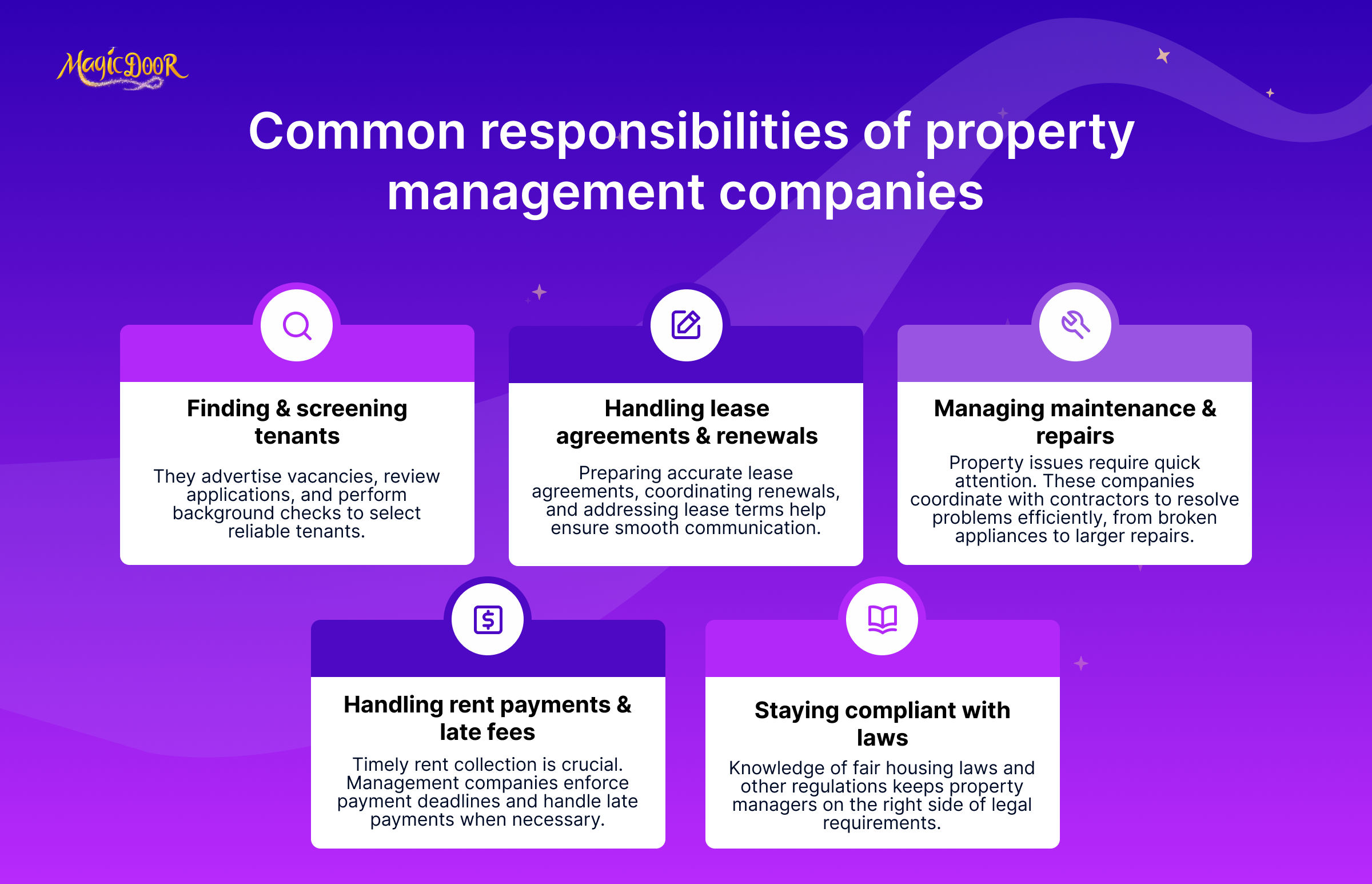
The workload doesn’t end with these tasks for someone running a property management business.
A sound property management business plan, a clear fee structure, and strong project management skills form the foundation of a successful business. Using tools like property management software can automate most operations.
Step 1 - Research Local Market Demand
Before starting a property management company, understanding the demand in your area is essential.
Evaluating the specific needs of your local market will help you determine whether there’s room for another business or whether adjustments to your plans are necessary.
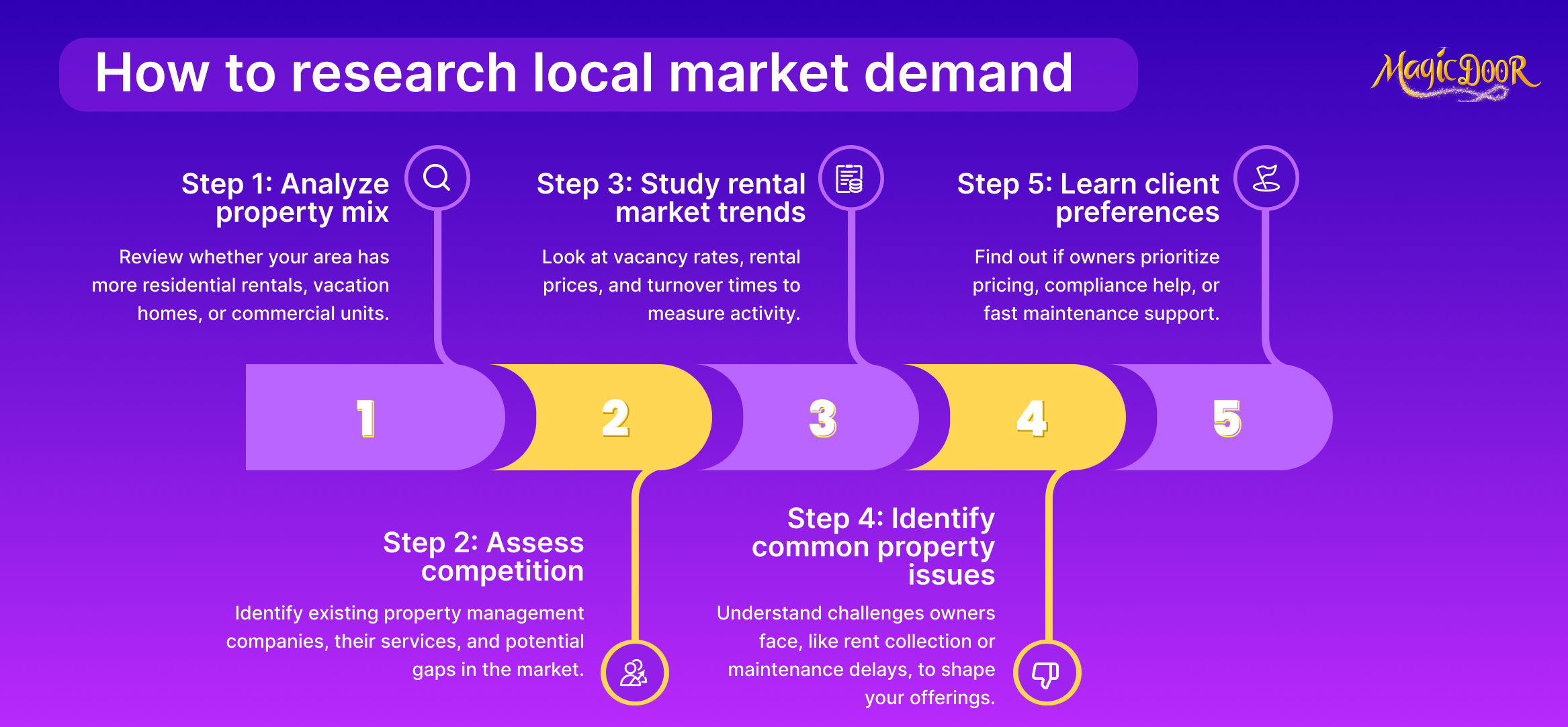
Start by analyzing the types of rental properties in your area.
Are there more residential units, vacation rentals, or commercial spaces? Understanding the rental property mix can help you define your business’s services.
Look into the number of existing property management companies near you and what kinds of management services they provide. This information highlights the competition and uncovers potential gaps you can fill.
Key factors to consider during market research include:
- Rental market trends: Check vacancy rates, average rental prices, and tenant turnover times to identify how active the market is in your area.
- Common property problems: Are property owners frequently reporting challenges with collecting rent, securing tenants, or dealing with maintenance requests? Such insights could help shape your offerings.
- Client preferences: Learn what property owners value most in a management company. Is it competitive pricing, efficient maintenance handling, or compliance assistance? Understanding their expectations will allow you to develop a practical service list.
To collect this information, review local real estate data, speak with real estate agents, and connect with property owners directly. Surveys, online forums, or networking events are great ways to collect helpful feedback.
How to Identify Local Demand For Property Management Business

Identifying local demand is a critical first step when planning a property management business. Knowing who needs your services will help refine your offerings and shape your marketing strategy.
Start by assessing the types of properties consistently rented in your area.
Look for concentrations of apartments, single-family homes, or commercial spaces. Areas with many rental properties often indicate a robust need for property management services. Real estate market reports are excellent tools for understanding vacancy rates, property types, and rental pricing trends.
Engage with local real estate agents to gain insights from professionals interacting daily with property owners and tenants. Their experience can reveal gaps in the market and point out areas with growing demand.
Conversations with these experts are also a great way to network and attract future referrals for your property management company.
Consider these approaches to collecting information:
- Survey property owners: Reaching out to landlords can provide valuable insights into their challenges. Many owners prefer working with property managers to streamline rent collection or tenant screening efforts.
- Analyze competitors: Study other property management companies operating nearby. Pay attention to the services they emphasize and any complaints property owners might have about those providers.
- Review local trends: Researching trends in population growth, job opportunities, and new developments can show where potential demand may grow. When more rental properties appear in a particular neighborhood, the need for property management often increases.
Step 2 - Create a Solid Business Plan
A solid business plan is the blueprint for starting and growing a successful property management company. It outlines your goals, details your steps to achieve them, and sets the foundation for long-term growth.
Start with an executive summary highlighting your property management business’s offerings and the local market needs it will address. This overview communicates the key elements of your plan to potential investors or lenders.
Follow this by including a company description that explains your mission, vision, and the specific services you provide to property owners.
A thorough market analysis is essential.
Research the real estate market in your area, identify demand for property management services, and assess the level of competition.
Evaluating what other property management companies offer can help you discover opportunities to differentiate your business. Including this data strengthens your business plan and provides a clear direction.
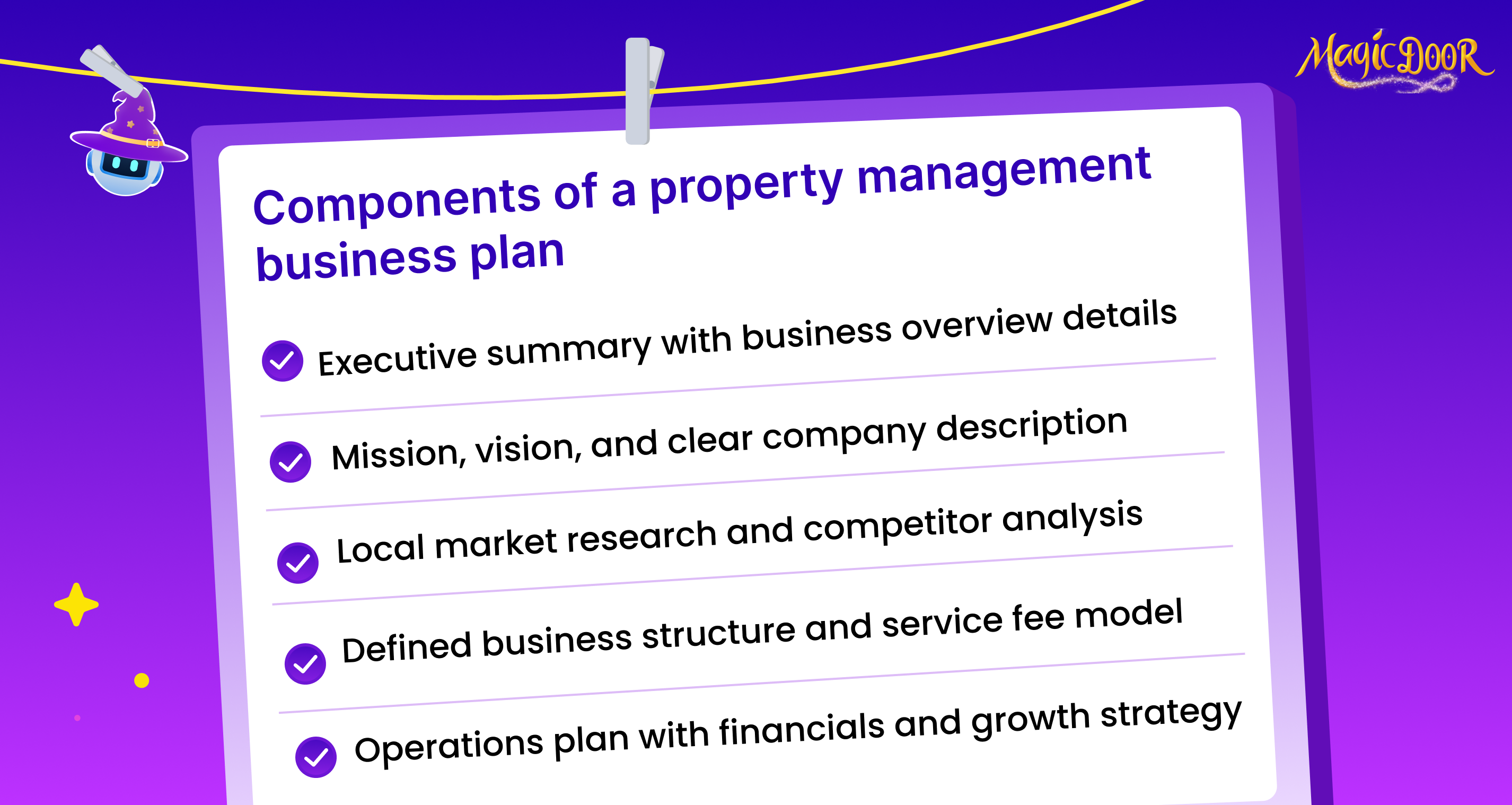
Consider these components when building out your plan:
- Business structure: Decide if your company will be a sole proprietorship, partnership, or private corporation. Many property managers choose a Limited Liability Corporation (LLC) to protect personal assets.
- Fee structure: Outline how you’ll charge property owners for your services. Depending on the level of management required, common options include percentage-based fees, flat fees, or per-project fees.
- Financial projections: Estimate startup costs, ongoing expenses, and projected income. It’s important to detail how the company will remain viable over time.
- Marketing strategy: Plan to attract clients through local advertising, social media, and real estate connections. Be specific here, as a clear strategy will help set expectations.
- Property management operations: Include plans for handling key operations such as maintenance requests, rent collection, lease agreements, and tenant communications. Using property management software can simplify these tasks.
How To Set a Pricing Structure?

The right pricing structure is critical for creating a sustainable property management business. It directly influences one’s ability to attract clients and ensures that one’s services remain competitive in the local market.
Start by identifying common pricing models used by other property management companies.
Some models include percentage-based fees, flat fees, or per-service charges. A percentage-based approach involves charging a percentage of the monthly rental income for comprehensive management services.
Flat fees, on the other hand, work well for landlords with predictable needs or fewer properties. Per-service charges allow you to bill property owners for leasing or handling maintenance requests.
When figuring out your pricing, consider the following factors:
- Local market rates: Investigate what other property managers charge in your area. Pricing too high could deter clients, while undercharging may hurt your bottom line.
- Service list: List the services you’ll provide, from tenant screening to lease agreements or rent collection. Tailor your pricing to align with the type and volume of work involved.
- Property type: Rental properties vary, so your fee structure might need to adapt based on whether you manage single-family homes, apartment buildings, or commercial spaces.
- Additional fees: Include clear details about charges for extras, such as eviction fees, lease renewal fees, or addressing maintenance requests outside regular operations.
Step 3 - Register Company & Obtain Licenses
Proper registration and licensing are vital parts of establishing a property management company. These steps ensure compliance with regulations while protecting your business and its operations.
Start by choosing a legal business entity that suits your property management business.
Many small businesses choose a Limited Liability Corporation (LLC) to shield personal assets and simplify taxation. Other options include sole proprietorships, partnerships, or corporations, depending on your growth plans and preferred business structure.
Once the entity is selected, register the company name with the appropriate local government agency.
Double-check availability to prevent conflicts and ensure the name aligns with local market expectations and your branding efforts.
Another necessary step is to separate personal and business finances.
Open a business bank account under the company’s legal name. This simplifies financial tracking and appears more professional to property owners when accepting payments like management fees or eviction charges.
Complying with legal requirements helps build trust with property owners and sets the stage for operating a professional property management company.
What Licenses and Permits Do You Need to Start a Property Management Company?

Securing the correct licenses and permits ensures compliance with regulations that govern the property management industry and protects your business from penalties or setbacks.
Here are the licenses and permits you may need:
- General business license: This is typically required to operate legally within your jurisdiction. The application process varies depending on local regulations, so check with your city or state government offices.
- Real estate broker’s license: Many states mandate this license, particularly if your property management business involves negotiating lease agreements, managing security deposits, or collecting rent. If you are not licensed, you may be required to take state-approved courses and pass an exam.
- Fair housing certification: Property managers must understand fair housing laws. This certification ensures they adhere to non-discriminatory practices when working with tenants and property owners.
- Tax Identification Number (TIN): You’ll need this to handle tax responsibilities and open a business bank account. Apply through the IRS to secure an EIN (Employer Identification Number), which functions as your company’s TIN.
- Zoning permits: Some areas restrict where businesses, like property management companies, can operate. Be sure to verify zoning laws when establishing office space.
Aside from these, some states may require additional certifications or permits depending on the scope of your services. A real estate attorney can help identify what’s necessary for your business location.
Step 4 - Set Up Accounting & Systems
Strong accounting practices and efficient systems ensure smooth operations, accurate financial tracking, and a positive experience for property owners and tenants.
To begin, choose accounting software tailored to the property management industry.
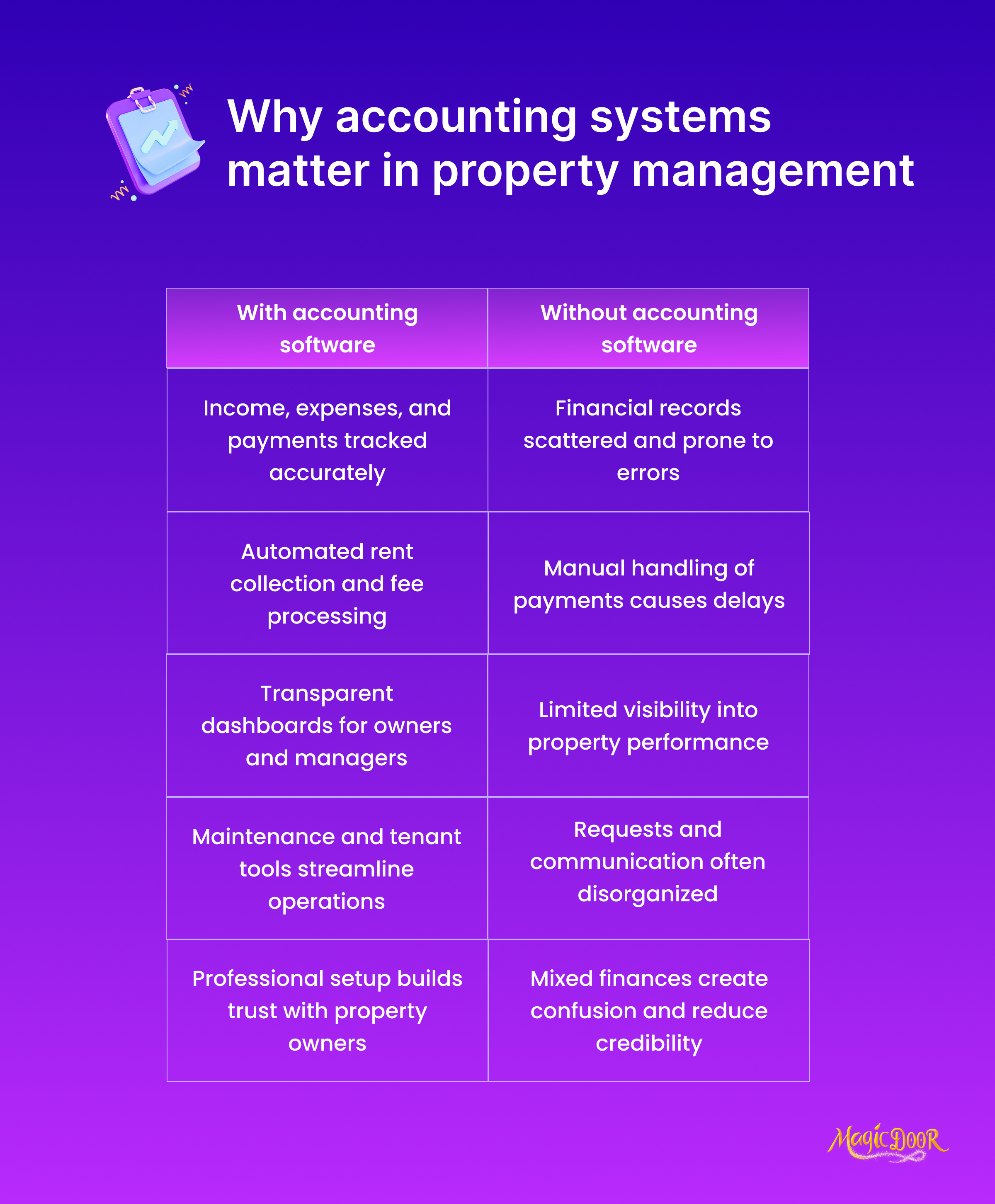
Software solutions like these simplify tracking income, recording expenses, and managing payments, including lease renewal fees and management fees. Ensure your chosen system supports features like collecting rent, handling security deposits, and generating financial reports.
Automating repetitive tasks with AI property management software saves you time while ensuring precision.
Clear processes for handling money are equally important. Open a business bank account to separate personal transactions from business finances. This helps with recordkeeping and builds trust by showing professionalism when working with property owners.
Next, develop systems for operational efficiency. Consider tools that help with the following:
- Maintenance management: Systems that organize maintenance requests streamline communication with contractors, ensuring quick solutions for tenants.
- Tenant communication Tools offering messaging or notification features simplify sending updates and reminders.
- Property advertising: Platforms to promote vacant properties allow you to attract potential tenants faster.
Digital tools also provide transparency to property owners. Many systems create dashboards showing properties' performance, from rental income to work orders.
Step 5 - Develop Legal Contracts & Policies
Clear contracts and well-defined policies structure business operations and protect everyone involved, including property owners, tenants, and managers.
Start by creating a property management agreement. This document outlines the responsibilities of property managers and owners, including details like management fees, lease renewal fees, and responsibilities for maintenance requests.
Ensure this contract complies with local laws and includes clauses clarifying termination terms, payment structures, and dispute resolution.
Address essential tenant management matters within your policies.
Cover security deposits, acceptable use of the property, and late rental payment penalties. Document these rules in the lease agreement to ensure tenants understand expectations and consequences.
Consulting a real estate lawyer during this phase can provide peace of mind. They can review your contracts to confirm compliance with fair housing laws and other regulations that apply to the property management industry.
Having internal policies is just as critical. Define how your company handles emergencies, maintenance requests, and complaints. Consistency in responses shows tenants and owners that your property management company operates professionally and fairly.
Step 6 - Build a Property Owner Network

Developing strong relationships with property owners brings consistent business and helps establish a reputation within the property management industry.
Building these connections requires intentional outreach and consistent communication.
Start by identifying property owners who might need management services.
Local real estate industry events, community associations, or online forums focused on real estate investments can be great places to connect. Networking with real estate agents or brokers can also lead to referrals.
Offering a clear explanation of your services, such as leasing fee structures, ongoing management support, or tenant communication tools, makes it easier for owners to see your company’s value.
Once you find potential clients, establish credibility by showcasing examples of your expertise. If you’re just starting, offer insights or tips on leasing, property owners’ legal responsibilities, and fair housing laws.
Sharing knowledge helps build trust, especially with investors looking for reliable management solutions.
Consider the following strategies to grow your network effectively:
- Attend local meetups: Real estate-focused meetups provide opportunities to meet investors and landlords in person.
- Partnering with industry professionals: Collaborate with real estate attorneys, developers, or mortgage brokers who can recommend your services.
- Create online content: Blogs or social media posts about rental market trends or efficient property management practices can attract potential clients searching online.
Maintaining relationships within your network is equally important.
Regular updates, transparent communication, and a commitment to addressing concerns build lasting partnerships. Each satisfied client increases the chances of referrals, helping your property management company grow in reputation and reach.
Step 7 - Invest in Property Management Software
Choosing the right software automates daily tasks, organizes client and tenant information, and ensures smooth processes. Investing in reliable property management tools early sets a foundation for long-term growth and efficiency.
When selecting software, ensure it includes features tailored to the property management industry. A good system can help you collect rent, track leasing fees, and manage maintenance requests.
Many tools also offer automation for late payment reminders or expense tracking, which saves valuable time.
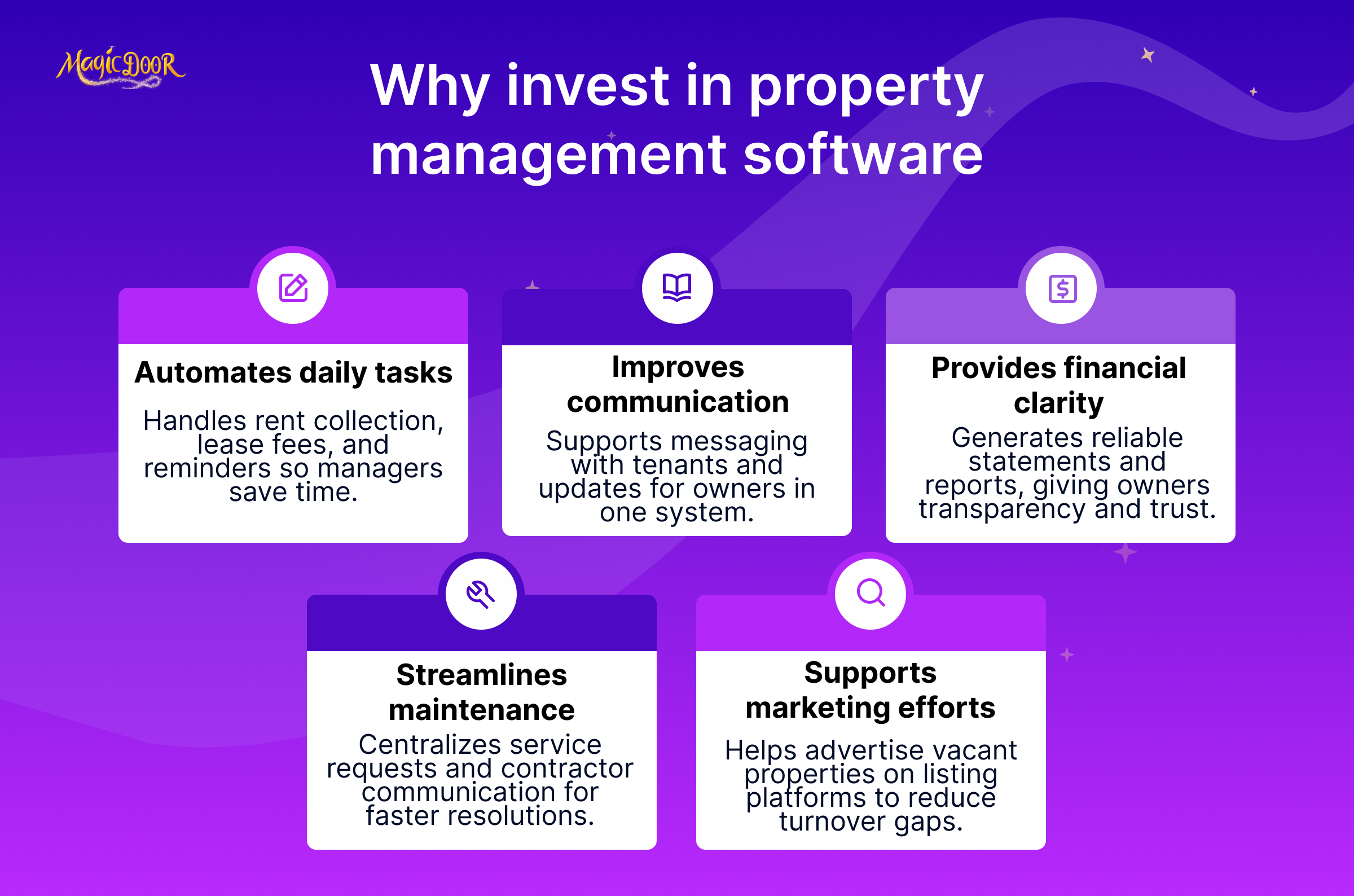
Look for software that supports tenant communication and owner reporting.
Platforms that allow you to generate financial statements or send updates to owners enhance transparency and professionalism.
Other helpful functions to consider include:
- Payment processing: Simplify the process of collecting payments and tracking expenses.
- Marketing features: Some software helps list vacant properties directly on rental websites, minimizing turnovers.
- Maintenance management: Streamline how you handle service requests by centralizing communication with tenants and technicians.
Training additional staff members, such as admins, on new systems ensures your team can benefit.
Why Automating Property Operations Matters
Automation has become a valuable tool for property management companies that aim to improve efficiency and simplify repetitive tasks. Understanding its role can make everyday operations much smoother for anyone starting a property management business.
Managing multiple properties often involves balancing numerous responsibilities, from tracking leasing fees to coordinating maintenance.
Automating routine tasks like collecting rent or sending reminders for late payments ensures no detail is overlooked. This is particularly useful for property managers who manage growing portfolios or several clients.
Property management software also centralizes important data, making accessing and updating information easier. You won’t need to spend hours digging through emails or spreadsheets to find tenant information or expense details.
Consider how automation can help with:
- Rent collection: Features like automatic invoicing and online payment portals simplify how tenants submit payments.
- Maintenance coordination: Logging and assigning rental house repair requests becomes quicker, allowing you to respond to tenant needs promptly.
- Lease management: Tools that send alerts for pending lease expirations or renewals keep you ahead of critical deadlines.
Ultimately, automating operations with automation can support a property’s success.
Property managers can devote more attention to building relationships and managing client expectations when tasks run effortlessly.
MagicDoor: The AI-Powered Property Management, At No Cost
Property management becomes a new experience with MagicDoor, an AI-powered platform that automates all core functions, simplifying operations for landlords and property managers.
MagicDoor’s built-in AI, designed specifically for property management tasks, sets it apart. Unlike systems that rely on third-party tools or basic plugins, this AI is a personal assistant that works directly within your workflows to handle repetitive duties efficiently.
MagicDoor’s automation spans various operations, increasing productivity and reducing manual errors.
Tasks that would take hours are completed quickly without requiring extensive user input. Whether you manage a single unit or an extensive portfolio, this solution adapts to your needs while remaining affordable, with no subscription fees.
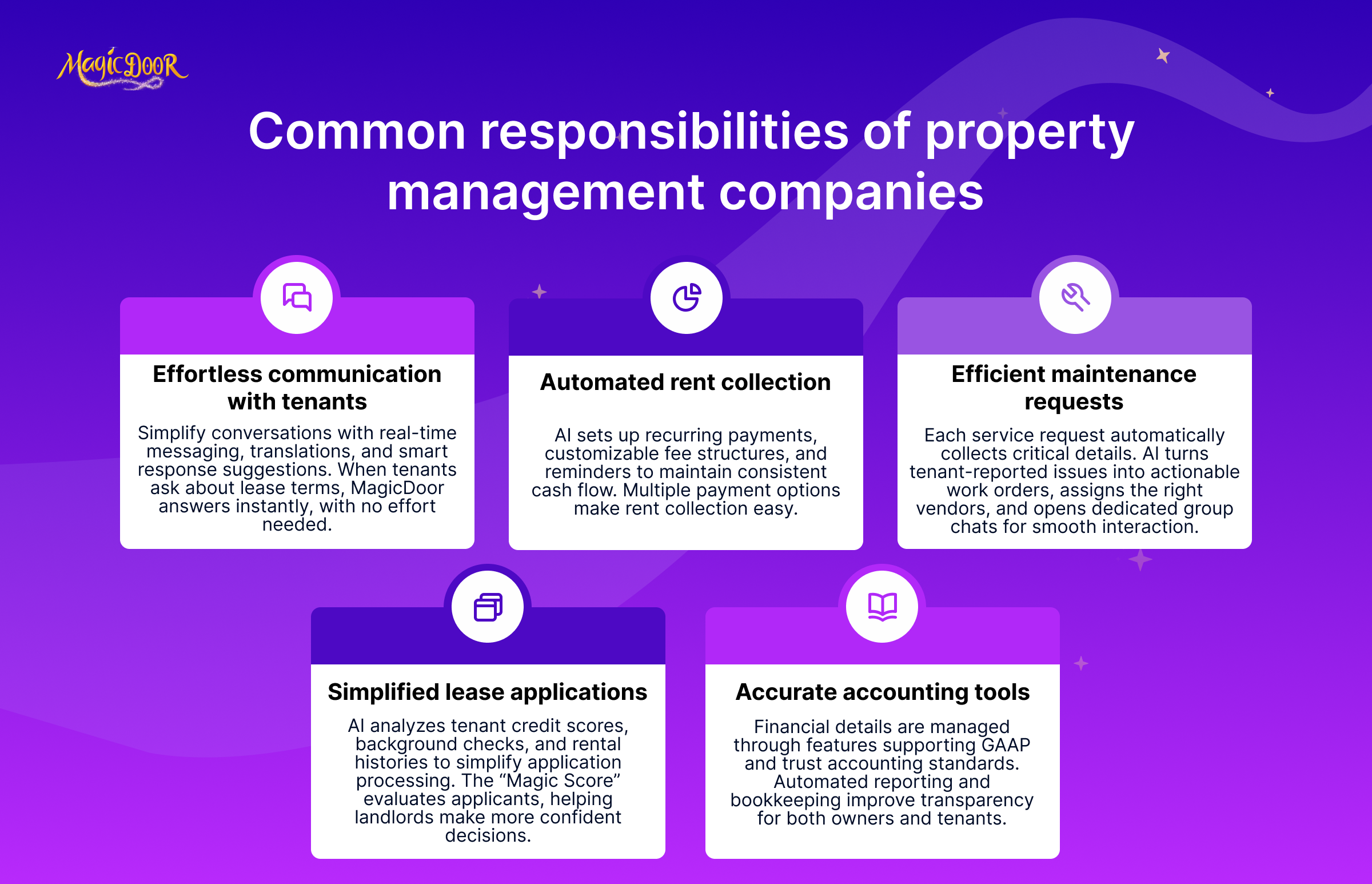
Here’s a look at how MagicDoor’s AI changes property management for the better:
- Effortless communication with tenants: Conversations with real-time messaging options, automatic translations, and accurate response suggestions are streamlined. Tenants can message about lease terms, and MagicDoor provides instant, precise answers without you lifting a finger.
- Automated rent collection: AI sets up recurring payments, customizable fee structures, and reminders to maintain consistent cash flow. With multiple payment options, including credit cards and bank transfers, collecting rent is no longer a challenge.
- Efficient maintenance requests: Each service request automatically collects critical details. AI turns tenant-reported issues into actionable work orders, assigns the right vendors, and opens dedicated group chats for smooth interaction. Fewer delays mean happier tenants and better-maintained properties.
- Simplified lease applications: AI analyzes tenant credit scores, background checks, and rental histories to simplify application processing. The “Magic Score” evaluates applicants, helping landlords make more confident decisions.
- Accurate accounting tools: Financial details are managed through features supporting GAAP and trust accounting standards. Automated reporting and AI bookkeeping improve transparency for both owners and tenants.
Compared to traditional methods, MagicDoor makes every part of property operations smarter. Its centralized platform boosts operational efficiency while maintaining professionalism.
Step 8 - Hire Skilled Support Staff
Building a strong property management company depends on strategies, technology, and the people supporting your operations.
Hiring skilled support staff ensures you have the right team to handle responsibilities efficiently. These individuals help property managers execute daily tasks and keep everything running smoothly, so you can focus on growth and client satisfaction.
When assembling your team, look for candidates with relevant expertise and a positive attitude.
Depending on your needs, roles might include leasing agents, maintenance coordinators, administrative staff, or additional property managers. Each position contributes to creating a professional and organized operation.
To hire effectively, outline clear job descriptions detailing responsibilities and expectations for each role. Define qualities such as attention to detail, communication skills, and knowledge of the real estate management field.
Investing in training is equally important.
New hires must learn company policies, client expectations, and any property management software you’ve implemented.
Ideas for building your team:
- Start with the roles that align with immediate operational needs.
- Consider hiring staff who can adapt to additional property management systems or scalable workflows.
- Prioritize candidates with experience in real estate management, tenant interactions, or administrative coordination.
Key Roles in a Property Management Company

Assigning clear roles ensures operations run smoothly and helps meet the needs of property owners and tenants.
Each position within a property management company contributes to a seamless client experience. Understanding these roles allows you to build a team that enhances efficiency and professionalism.
Here are some of the key roles to consider when structuring your business:
- Property manager: This role oversees the day-to-day operations of the properties under management. Responsibilities include tenant communication, scheduling maintenance, and monitoring compliance with lease terms.
- Leasing agent: These professionals focus on attracting and signing tenants for rental properties. Duties often include marketing available units, conducting property tours, and managing leasing paperwork.
- Maintenance coordinator: It is crucial to keep properties in good condition. Maintenance coordinators handle repair requests, schedule vendor visits, and oversee work completion.
- Administrative assistant: Administrative staff provide essential support by managing files, invoices, and correspondence. They play behind-the-scenes roles that organize daily workflows, from processing tenant applications to tracking appointments.
- Accountant or bookkeeper: Managing finances is a significant aspect of property management. Accountants track rent payments, prepare financial reports, and ensure compliance with accounting regulations.
Step 9 - Market Services to Property Owners
Property owners often seek reliable partners to help manage their investments efficiently. Highlighting your company’s value and expertise can make it stand out.
Start by understanding your potential clients.
Property owners typically care about maximizing rental income, keeping vacancies low, and maintaining their properties. Tailor your messaging to show how your services meet those needs. Showcase your ability to manage tenant placement, maintenance coordination, and rent collection tasks.
Ways to market to property owners:
- Create a professional website. Include detailed information about your services, team, and how you solve common property management challenges. To build credibility, highlight testimonials from satisfied clients.
- Use targeted advertising. Social media platforms and search engine ads can help you reach property owners in specific areas. Focus on features that align with owners’ main concerns.
- Build relationships in your community. Attend real estate meetups and network with investors, brokers, and homeowner associations. Personal connections often lead to valuable referrals.
- Offer free tools or resources. Consider creating guides, webinars, or downloadable templates that provide value to property owners. For instance, a checklist for landlords starting their rental business could position you as an expert.
Strong communication is another key factor.
When potential clients contact you, respond quickly and professionally. Be transparent about your pricing, services, and company operations. Many owners appreciate clear, straightforward answers that build trust.
Step 10 - Focus on Excellent Client Service

Property owners and tenants rely on your expertise and professionalism to create a positive experience.
To deliver outstanding client service, consider prioritizing communication.
Regular updates help property owners stay informed and ensure that tenants feel supported. Timely and clear communication, whether it’s about financial reports or maintenance issues, can make a substantial impact.
Tips for offering excellent service:
- Respond quickly to concerns: Timely responses show clients and tenants that their time and needs are respected.
- Keep property owners informed: Regularly update them on occupancy rates, revenue, and any ongoing property issues they should be aware of. Sharing insights helps build trust.
- Resolve tenant issues: Anticipate common problems and have a plan to address them before minor concerns escalate.
Satisfied clients often lead to recommendations, which are valuable for any property management company. Word of mouth remains one of the most trusted forms of marketing, and great service ensures happy clients are eager to recommend your business.
Conclusion
Building a property management company can be rewarding, but success begins with careful planning and execution.
Each step is important in establishing the foundation for your business, from researching the market and creating a solid business plan to hiring skilled staff and using property management software like MagicDoor.
If you’re ready to take the next step, now is the time to focus on turning these strategies into action.
A well-structured plan and consistent effort can help you start an efficient property management company built for lasting success.

